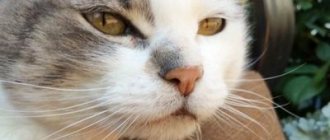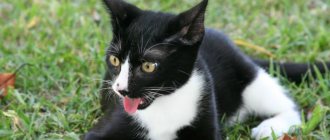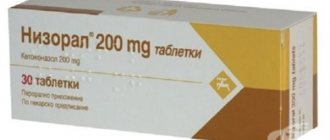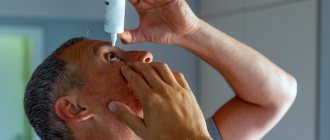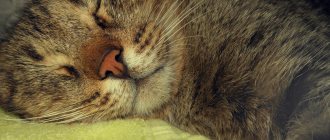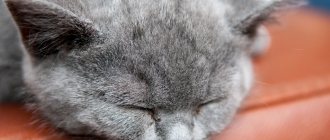Home » Useful Information
Increased salivation in cats can appear for completely harmless reasons, but in some cases the provocateur becomes a pathology that requires mandatory treatment. When such a clinical picture occurs, competent differential diagnosis is important, which will help to identify the disease in the pet at the initial stage.
- 2 Causes of hypersalivation
2.1 The main causes of hypersalivation in cats - video
- 4.1 Drugs that are used to eliminate the causes of hypersalivation - photo gallery
Oral problems
Dental disease is the usual explanation. In such cases, cats drool to soothe irritation in the mouth or throat.
If swallowing is painful, your cat may drool from the mouth. Your cat may avoid food due to pain when swallowing or eating. Common causes of mouth pain in cats include:
- Dental disease (gingivitis)
- Tumors or ulcers in the mouth
- Broken tooth
- Foreign body under the tongue
- Exposure to toxic chemicals
- Recent interactions with a toxic plant
- Trauma, damage. For example, if your cat chews on an electrical cord and gets electrocuted.
Drooling may be accompanied by other symptoms such as:
- Halitosis (bad breath)
- Weight loss
- Loss of appetite
- Lack of interest in solid foods
- Throwing away food while eating
According to the Canadian Veterinary Medical Association, feline resorptive lesions (FORL), neckline erosions, internal or external root resorptions and neck lesions commonly lead to dental disease in cats, which can cause severe drooling and oral pain.
Signs of excessive drooling
The presence of food or any irritant in the cat's mouth causes the production of saliva. Sometimes increased secretion of glands occurs for other reasons. You can notice the manifestation of drooling by characteristic factors in your pet’s behavior:
- often rubs its muzzle on the corners of furniture to get rid of accumulated excess;
- the cat often swallows and rubs its muzzle with its paw;
- The pet's tongue seems to fall out of the mouth and becomes flaccid.
Cat drooling
Drools flow in different ways:
- actively in streams or drops;
- slowly, imperceptibly at first glance.
An observant owner will notice the appearance of dampness in the places where the animal sleeps, the accumulation of wet fur, “icicles” on the pet’s neck and paws.
Respiratory diseases
Viral respiratory diseases can lead to ulcerations in your cat's mouth. This may cause mouth pain and increased salivation. Cats that live in shelters or multi-cat homes have a higher risk of respiratory infections.
The veterinarian must treat infections. However, you can take steps to prevent your cat from becoming infected. Some of these include keeping your cat indoors, ensuring up-to-date vaccinations, limiting interactions with other pets, and washing your hands after handling other animals.
Dangerous infections
Diseases in this category are characterized by an acute course.
Excessive salivation is one of the few symptoms accompanying the pathology.
Worm infestations
A large accumulation of parasites in the intestines of an animal leads to poisoning of the body and disruption of the digestive system.
Feline viral leukemia
Causes of occurrence: when the membranes of the digestive and respiratory organs become inflamed, retroviruses suppress the cat’s immune system, which leads to the development of stomatitis, gingivitis, lymphadenitis, resistant to therapy, and neoplasms appear.
This disease is similar to cancer, is a viral form of leukemia, and is often fatal.
Rabies
Dangerous viral disease of animals. The causative agent is the Rabies virus. It affects the cat's nervous system, leading to inflammation of the spinal cord and brain.
The sick animal is isolated from the household. The disease cannot be treated and is fatal.
Associated symptoms:
severe drooling;- inappropriate behavior;
- convulsions;
- rabies;
- voice change;
- paralysis leading to changes in gait.
With rabies, a cat may eat inedible objects; it is irritated by water and its murmuring.
Aujeszky's disease
This is a viral infection that an animal becomes infected with by eating raw pork. With pseudorabies, the nervous system is affected, encephalitis develops, and pathological salivation begins.
Kidney failure
Kidney failure can manifest itself in acute or chronic conditions. Cats with chronic renal failure (CRF), also called chronic kidney damage, often exhibit clinical signs of increased thirst, weight loss, dilute urine, increased urination (manifested as large collections in the litter box), halitosis, and drooling. .
This condition occurs when the kidneys are unable to remove waste products, creatine and BUN from the body. As these wastes accumulate in the bloodstream, they create uremic ulcers in the stomach, mouth, and esophagus. A veterinarian often treats kidney disease by:
- Medicines
- Intravenous fluids
- Blood work monitoring
- Stomach protection
- Low protein diet
Causes of hypersalivation
Excessive salivation occurs for many reasons. The most common manifestations are associated with:
- with physiological processes,
- with nervous tension;
- with the development of pathology.
The impact of provoking factors is observed in cats of different breeds and ages. If there is pathology in behavior, changes are also possible:
- decreased appetite;
- lethargy or, conversely, excitability;
- vomiting, diarrhea;
- itching;
- cough;
- elevated temperature.
Manifestation of hypersalivation
If the manifestation of hypersalivation, i.e. deviations from the norm are observed frequently and require diagnosis.
Ingestion of a foreign object
If your cat ingests something unpleasant or toxic, one of the first reactions may be drooling. Sometimes the toxin entering the body can also cause oral erosion, which can also lead to drooling.
Swallowing a thread with a needle attached or a foreign body that can become lodged in the tongue, back of the throat, or soft or hard palate can cause oral pain and drooling.
Your cat may also have difficulty closing his mouth. If a foreign body, such as a fish bone, gets stuck in the esophagus, the saliva has nowhere to go. It will begin to accumulate in the cat's esophagus and pour out of the mouth.
© shutterstock
If you notice a rope hanging from your cat's mouth, do not try to remove it. The thread can wrap around vital organs such as the stomach or intestines. Pulling can cause significant permanent damage.
If swallowing is uncomfortable, your cat may put her paw on her mouth and try to vomit. The inability to swallow properly can cause cats to have a lack of appetite and unexplained weight loss.
What is the norm of saliva secretion?
There are times when it is normal for a cat to drool. Saliva is an important fluid in the body that performs a number of functions: protects teeth, gums and oral mucosa from damage, facilitates chewing food by lubricating or gluing it, facilitates swallowing, has a bactericidal effect, and much more. That is why, in some cases, copious amounts of saliva should not cause you concern, namely :
- when an animal sees food or smells it;
- during feeding;
- while chewing food;
- when she is stroked and your pet enjoys it;
- Current drooling in a cat can be observed when taking tasteless and bitter medications (for example, no-shpa or deworming medications);
- with strong nervous feelings.
The amount of saliva produced usually only increases slightly if the cat's health is good. Usually, saliva can be seen a little on the fur around the mouth, but if the process lasts longer than 10-15 minutes and there is much more drool, you should start to worry.
© shutterstock
The process of salivation or drooling itself is called salivation , so if you notice any abnormalities regarding this phenomenon and decide to see a doctor, do not be alarmed if he diagnoses hypersalivation or ptyalism. These scary words just mean that the cat is drooling more than it should from its mouth.
Caustic poisons
Cats cannot metabolize chemicals and medications well. This is due to their altered metabolism in the liver, called glucuronidation.
Corrosion from chemicals (washing detergents, floor cleaners, weed killers, etc.) can cause burns to the mouth, tongue, esophagus and stomach. If swallowed, they can cause poisoning and severe drooling.
If you suspect that your cat has recently been exposed to a caustic chemical, you should rinse her mouth with water. After rinsing, offer your cat something she will enjoy drinking, such as chicken broth. This will flush the esophagus and loosen the toxin in the mouth.
Treatment of pathologies associated with the symptom
If increased salivation is caused by physiological factors, then no special treatment is provided. Psychological and pathological causes require mandatory therapy. What treatment methods are used depending on the factor:
- If the cause is nervous overstrain, cats are usually prescribed sedative medications: Stop Stress, Fitex, etc. Such drugs help eliminate the effects of stress. The course of treatment often does not exceed 7–14 days. Stop Stress is usually given 1 tablet per day or 1 drop per 1 kg of weight, and Fitex 3-5 drops per day. The exact dose is determined by the doctor. In addition, it is important to provide the pet with peace and surround it with affection and care.
- For diseases of the oral cavity, anti-inflammatory drugs are used, such as Dentavedin gel, Zubastik spray, etc. These drugs eliminate swelling of the gums and have an antiseptic and healing effect. Gel Dentavedin contains bee products, chlorhexidine and medicinal plants. It should be applied 2-3 times a day to the gums for 5-7 days. Zubastic spray also contains plant extracts and an enzyme anti-inflammatory complex. The medicine is irrigated into the mouth several times a day for a week.
- If a cat has a bone or other foreign object stuck in its throat or teeth, it must be removed in a veterinary clinic. For these purposes, the doctor can use tweezers or an endoscope. Immediately after removing the foreign body, hypersalivation stops. It is dangerous to independently remove a bone stuck in the larynx, as you can push it further or injure your pet (especially when using tweezers).
- If the cause is the rabies virus, which was diagnosed in the laboratory, then, unfortunately, the pet is euthanized. This disease is incurable and dangerous not only for animals, but also for people. Therefore, if rabies is suspected, the cat is quarantined until a diagnosis is made.
- In case of poisoning, the pet is prescribed adsorbents such as activated carbon. The tablet must be crushed into powder and dissolved in 1 tsp. water, then forcefully pour it into your pet’s mouth. However, if the intoxication is severe, then urgent hospitalization is required, which includes gastric lavage. In addition to adsorbents, the animal should be given 20 ml of water every hour from a syringe without a needle if it does not drink on its own. This procedure will prevent dehydration.
- If the provoking factor for hypersalivation is helminthic infestations, anti-helminth medications are prescribed, such as Prazicide, Drontal, etc. In most cases, a single application is enough to rid your furry friend of parasites. The dose should be calculated based on the cat's body weight.
- The presence of tumors requires treatment only in a hospital setting. In this case, they resort to surgical intervention, which is aimed at excision of the tumor. Additionally, medications may be prescribed: Metastop, Cytostat, etc. The first drug prevents the growth of tumors and reduces the risk of metastases, and also has an antitoxic effect. Cytostat improves the overall well-being of the pet. Additionally, it has an antioxidant and antitoxic effect, accelerating recovery.
- If the provocateur of increased salivation is an allergic reaction, then drug therapy is prescribed. For anaphylactic shock, glucocorticosteroids are indicated. They are also used for severe allergic reactions, which are accompanied by severe itching. The most commonly prescribed drugs are Dexamethasone and Prednisolone, which are administered intramuscularly. A single dose ranges from 0.1 to 0.5 ml. The exact amount of solution and course are determined only by the doctor, since steroid drugs can cause dangerous side effects.
- To eliminate mild allergy symptoms, classic antihistamines are used: Suprastin, Zodak, Cetirizine, etc. They are usually given to the pet orally, a quarter of a tablet, once a day. The course is determined by the doctor. It is important to identify the allergen and eliminate it. Otherwise, after stopping therapy, the symptoms will return again.
- Calcivirosis can be eliminated with the help of complex treatment. When bacterial flora attaches, which happens in most cases, the pet is prescribed antibiotics (Tetracycline, Amoxicillin). Additionally, they resort to intravenous infusion of physiological solutions, as well as vitamin therapy. Anti-inflammatory medications such as Levomekol are used. The ointment is applied to the affected areas several times a day. To speed up recovery, immunostimulants are prescribed: Imunofan, Fosprenil, etc. The course of treatment depends on the severity of symptoms and is determined only by a doctor.
If the cause is inflammatory diseases of the gastrointestinal tract, then the cat is prescribed a gentle diet. Your pet's diet should be free of fatty, smoked and salty foods. At the same time, food is selected for sensitive digestion. It is advisable to give preference to reputable brands such as Royal Canin, Arden Grange, Pro Plan, etc. There are special lines for pets with digestive problems:
- Royal Canin Sensible 33;
- Arden Grange Sensitive;
- Pro Plan Delicate.
Royal Canin Sensible 33 is designed for pets with sensitive digestion
Attention! Without prior consultation with a doctor, you should not resort to drug therapy, especially potent drugs, which, if used incorrectly, can only cause harm.
My cat always drooled after I gave her any medicine. At first it seemed to me that the drug was toxic, which is why I had this reaction. I thought that I only made the pet worse with this treatment. It turns out that increased salivation is a normal reaction to bitters in cats. Hypersalivation is also observed when you squeeze and pet an animal excessively. According to the veterinarian, there is nothing wrong with this.
Drugs that are used to eliminate the causes of hypersalivation - photo gallery
Stop Stress has a calming effect
Activated carbon helps remove and bind toxic substances Drontal helps remove helminths
Dexamethasone eliminates acute allergic reactions Zodak relieves allergy symptoms Metastop has antitumor properties Dentavedin has an anti-inflammatory effect
Fosprenil accelerates recovery from calcivirosis
Poisonous plants
According to Mark S. Thompson, plants containing insoluble calcium oxalate crystals can cause a severe burning sensation in the mouth if your cat accidentally ingests them. Plants that are poisonous to cats include:
- Peace Lily
- Calla Lily
- elephant ear
- Dieffenbachia
- umbrella plant
- mother in law tongue
Insoluble calcium oxalate in plants causes minimal toxicity in cats, but can cause unpleasant reactions. If you have one of these plants and you suspect a cat has gotten into it, rinse its mouth with water and then give the broth.
Emotional Stimuli
Cats drool when they are excited, scared or anxious. If your cat is nauseous, worrying about vomiting may lead to drooling.
For example, cats are rarely driven in cars unless they are being taken to a veterinarian. Such trips can bring back bad memories for your cat and make her feel apprehensive and nauseous. Signs of anxiety in cats include open-mouth breathing and panting.
Some cats drool when they are calm and relaxed or when they enjoy being cuddled or rubbed. This is common in cats and is a physiological response to feeling happy. Sometimes cats drool while sleeping, again because they are very relaxed. This drooling often indicates that the cat is feeling comfortable.
© shutterstock
Injury
Trauma to the mouth can cause excessive drooling. Oral injuries can occur if a cat bites through an electrical cord and suffers a burn to the mouth. If your cat has recently gotten into a fight with another cat, any trauma to the mouth, such as a broken jaw, may cause drooling.
Keeping a cat indoors reduces the chance of injury from being hit by a car or attacked by a rival cat for territory. An injury to a dislocated temporomandibular joint or a fractured jaw can lead to excessive drooling due to the cat's inability to close its mouth.
If you suspect your cat is drooling due to an oral injury, a thorough oral examination and x-rays may be required to make an accurate medical diagnosis.
If your cat is drooling, what should you do?
You should not start self-medication until a diagnosis has been made.
If your cat is drooling, what to do:
- Cats have a very delicate sense of smell, so they rarely get poisoned by eating expired, spoiled or unsuitable food. However, it is precisely because of their keen sense of smell that cats can become poisoned by household chemicals. When using chemical solutions, the main mistake is to try to rinse the animal's stomach. If you induce vomiting in an animal by pressing on the root of the tongue, thereby trying to return the contents back, you will additionally injure the food passages and stomach.
- The chances of recovery are significantly reduced. That is why we recommend giving your animal several tablets of activated carbon. If it is not there, Enterosgel or Smecta will do. Feed the animal with these sorbents, they will absorb all toxic substances, absorbing them and turning them into safe chemical compounds that will leave the body along with feces and urine.
- Owners of cats with long hair have noticed that these animals more often than others suffer from blockage of the food passages with hair. That is why we advise such animals to introduce more fiber, green grass into their diet, or purchase special supplements and food. They were created for long-haired breeds not by chance, and differ significantly in their composition. Made with the addition of fiber, which helps remove hair particles from the body along with feces. The risk of intestinal blockage by wool is minimized, which means that there will be much less saliva released when the intestines or esophagus are blocked by wool.
- Before eating, secretion is completely normal. It can stand out if the housewife is in the kitchen and uses the animal’s favorite product for cooking. This is also a reflex reaction of the body.
- In case of intestinal diseases, it is necessary to normalize the microflora of the digestive organs, and in case of colds, cure them. Of course, take care of your dental health.
- In any case, if you come into contact with other cats and then an increased amount of saliva appears, you should get tested for rabies and observe the animal’s behavior.
cat
Heatstroke
Flat-faced cats, such as Persians, have a higher risk of heatstroke, which can cause drooling. Although heatstroke is not as common in cats, too much time in the sun or not drinking enough water can have detrimental effects.
Cats love the sun. Always have fresh, clean water on hand. In the summer, make sure your cat has shady places to cool off. Keep your cat indoors on hot days. Never leave a cat in a parked car. Limit training and play time to keep your cat from overheating.
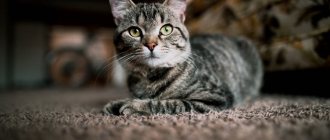
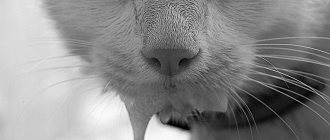

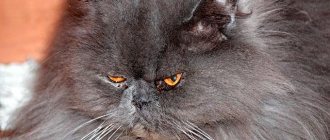
![Why is the cat drooling: [Find out the reason, What to do]](https://koriiza.ru/wp-content/uploads/pochemu-u-kota-tekut-slyuni-uznajte-prichinu-chto-delat-330x140.jpg)
